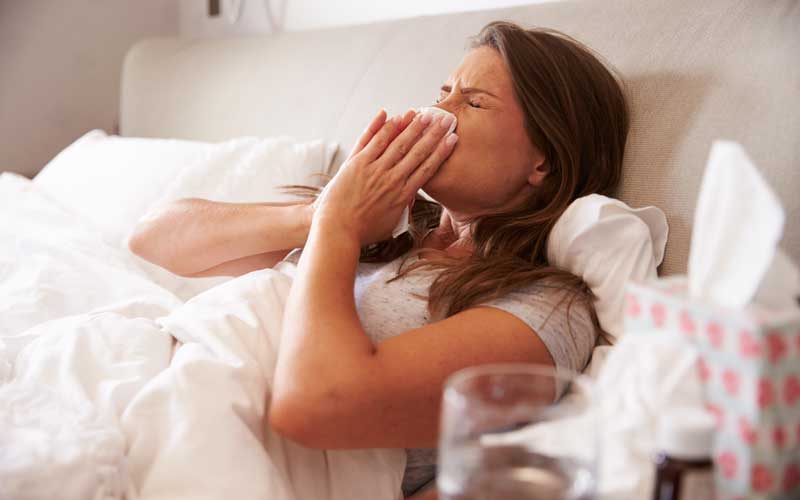Sleeping can be a challenge when you are sick. Symptoms like a stuffy nose can make it hard to breathe while coughing, and pain in the muscles can keep you awake. However, quality sleep is indispensable for recovery, and your body needs rest to get better.
Fortunately for us, there are ways to temporarily ease your symptoms in order to get the rest you need. It is possible to sleep well even with a common cold, and if you continue reading our guide on ‘How to sleep better with a cold’, you will learn how. We will try to explain the best ways to sleep with the flu and how to get the rest you need. So let’s get started!
How to sleep better with a cold or flu?

No one likes to be down with a cold, but sometimes we can’t avoid it, which is why we have to learn how to lessen our issues and get a good night’s rest. Here are the best ways to sleep better with a cold:
Drink something warm
A hot, steamy drink before bed may help soothe a sore throat and loosen up congestion. An excellent choice will be a decaffeinated tea with honey. Good options include ginger tea, chamomile tea and peppermint tea. All of them have properties that could help you relax, breathe easier or fight infections. Take a look at our article on ‘Best teas to drink before bBest Tea For Sleeping – 10 Good Choicesed’ for more info.
However, if you’re not a fan of tea, you can sip on a warm mug of water with lemon and honey, and get a hot soup or some low-sodium broth. Your aim is to drink a warm beverage about 90 minutes before you go to sleep. Keep in mind that drinking liquids too close to bedtime might cause you to wake up during the night because you need the restroom.
Take an NSAID
NSAID (non-steroidal anti-inflammatory drugs) is an over-the-counter (OTC) drug that can help if you’re feeling achy. Some cold symptoms can be alleviated with the help of these drugs. Common non-steroidal drugs that can be used without a prescription include ibuprofen, aspirin and naproxen.
As with any over-the-counter medication, you should check the label for the recommended dosage and follow the directions carefully. Don’t use NSAIDs for more than 3 days in a row if you have the flu and if you have pain, avoid taking them for more than 10 days. If your symptoms don’t go away, you need to speak with your doctor.
Try cough medicine
A common cold can keep you up all night and leave you feeling exhausted. However, if you consume an OTC cough medicine, you might receive temporary relief. Also, you should consider using an expectorant if you have mucus. This type of medicine loosens the mucus in your lungs, making it easier to cough out. Bronchostop and Benylin Mucus Cough are two examples of expectorant cough medicine.
A second option is an antitussive, which suppresses the cough. Antitussives are especially great for nighttime relief. Some cough medicines can contain decongestants, pain relievers, and antihistamines. It is best to avoid taking other medicines when you take cough medicine because of the presence of these ingredients.

Gargle with salt water
Gargling with salt water before bed can help soothe a sore throat and protect it from getting an infection. It’s a natural, low-cost way to ease discomfort when feeling sick. To make a saltwater gargle, you will need to mix 1/4 to 1/2 tsp salt into 250ml of warm water.
Then you have to let it sit until the salt dissolves. When that happens, you can gargle the mixture in the back of your throat for as long as you can tolerate it. Finally, you should swish the salt water around your mouth before spitting it out.
Use a vapour rub
A vapour rub is an ointment that is typically applied to your neck and chest. It usually contains ingredients like eucalyptus oil (loosens thick and sticky mucus), menthol (comes with an effect that makes it easier to breathe), and camphor (might suppress coughing and thin mucus). Yes, these ingredients may not treat your cold, but they might help you breathe easier and sleep more comfortably, which is always a plus.
Vapour rub should be applied only to your chest or throat area. It would be best if you don’t use it inside your nose, as it can be absorbed into your body through the membranes. Some people may experience skin irritation from the rub, which is why before using a new product, we highly recommend you test it on a small patch of skin first.
Turn on a humidifier
Dry air may irritate your sinuses, which potentially can worsen your symptoms. Adding moisture to the atmosphere is something a humidifier can help with. The benefits of humidifiers for treating colds have not been shown in research. However, added moisture in the air could help you breathe better while you sleep.
You should always use distilled or purified water in a humidifier, and it would be best if you change it every day. Also, cleaning it regularly to prevent bacterial and mould growth is a must!

Stack your pillows
Lying down can cause mucus to build up in your throat, making you cough and possibly restless nights. That said, we don’t mean you need to sleep sitting up. What we are trying to say is that you can try stacking your pillows on top of each other to lift your head slightly. This can help reduce mucus build up in your throat and get the much-needed rest you want.
But it’s a good idea to avoid using too many pillows as they could cause neck pain and discomfort, which can prevent you from sleeping well at night. You can elevate your head with just two high-quality pillows.
Take a steamy shower
The steam of a hot shower can help thin out the mucus in the nose and make it easier to breathe. A warm shower is also a good way to relax before it’s time for bed. It’s essential to make sure the water is comfortably warm. You want the bathroom door closed so that steam can accumulate.
You may want to use shower tablets with essential oils for a relaxing experience, which can calm your mind and body before bedtime. In addition, when inhaled, the cooling effects of essential oils and aromatherapy might help you feel less congested.

Avoid alcohol and caffeine
In some cases, alcohol can make you sleepy, but it is best not to consume it before bed. Your ability to get quality rest may be affected by drinking alcohol in the late afternoon or the evening. Also, alcohol is a diuretic. It stops the antidiuretic hormone in your kidneys from overproducing urine, meaning you might be waking up quite often to pee.
This can make it difficult for your body to recover from dehydration. So if you want to stay hydrated, avoid alcohol and drink a lot of water. Also, caffeine beverages such as coffee, sodas and other stimulating drinks are a big no-no. However, if you are persistent about having something to drink at night, check our guide on ‘Best drinks before you go to sleep.’
Keep your bedroom temperature
According to a study, the quality of sleep can be affected by the temperature of your bedroom. This is a factor that can be crucial when you’re fighting a cold and have a fever. Your bedroom should be kept between 18.6 and 19.4C to create a comfortable sleeping environment.
Bottom line
To conclude our article on ’10 ways to sleep better with a cold’, we would like to remind you that your symptoms can often last between 7 to 10 days. Therefore, it can be challenging to get good quality sleep in some cases due to congestion, coughing, or a runny nose.
The good news is there are many ways to relieve your symptoms. There are a variety of options, including medication, like cough medicine or nasal decongestants. Of course, if you are a bigger fan of natural remedies, you can always try saltwater gargles, a hot shower or a stack of pillows.
Some tips may work better than others, depending on your symptoms. If you’ve had a cold for more than three weeks, be sure to talk to your healthcare provider. Now it’s our turn to hear from you if any questions regarding the subject were left unanswered. If you want to share some information, we would gladly hear about it in the comments below.

